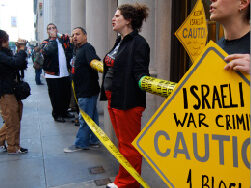

Twenty-two activists werearrested at Israeli Prime Minister Ehud Olmert's speech to the WorldAffairs Council on 22 October between 6:30 and 7:30pm at the Westin St.Francis Hotel at Union Square in San Francisco. Inside the auditorium,activists began disrupting the event by placing Olmert under citizensarrest. Every couple of minutes, more activists disrupted his speech,barely allowing him to speak, by reading the names of the childrenkilled in Gaza last winter, reading from the recently publishedGoldstone report and displaying banners that read "Lift the Siege onGaza" and "War Crimes are Not Free Expression!" Activists were removedfrom the auditorium chanting "war criminal!" and taken to theTenderloin Police Station where they are being held for citation. Tenadditional persons participated in the action but were not arrested.
Olmert ordered Israel's brutal attacks on Gaza beginning in lateDecember 2008, code-named Operation Cast Lead. Last week, the UN HumanRights Council passed a resolution endorsing the Goldstone report, anindependent investigation into the Gaza operation, which found thatIsrael violated international law and possibly committed crimes againsthumanity.
"Israel is an apartheid state guilty of war crimes and its leadersshould not be welcome in San Francisco," said Lisa Nessan, a Jewishresident of Oakland, who has traveled several times to Israel andPalestine, most recently in May. "For the past 60 years, underleadership like Olmert's, Israel has denied Palestinians their basichuman rights, built settlements on their lands, and killed civilians --all to force them from their homeland."
A lively protest also gathered across from the hotel in Union Square,where about 150 persons carried signs bearing the names and pictures ofchildren killed during Operation Cast Lead. Olmert is making severalappearances in the US this month, and has been met with strong protestsat locations including the University of Chicago and Tulane Universityin New Orleans. "We join with people around the world who believe thatIsrael and its leaders must be held accountable for their actions.Israel killed 1,400 people during its attacks on Gaza last winteralone, and many more have died or suffered from the effects of siege,occupation, and apartheid on their daily lives," said MonadelHerzallah, a Palestinian activist who lives in Fairfield and whose21-year-old cousin was killed in Gaza in January.
Organizers also expressed outrage that US President Barack Obama hasignored the findings of the Goldstone report. The US has pledged morethan $3 billion each year in unrestricted aid to Israel. "Israel's useof US aid and military equipment violates our own laws," said RaeAbileah, an organizer with CODEPINK whose father is Israeli. "Why arewe giving aid to a country that is destroying people's homes andattacking civilians, while our own nation is struggling withunemployment and underfunded social services?"
Eduardo Cohen of San Francisco sums up the sentiment: "The war crimesin the Goldstone Report are not an exception, but a reminder thatIsrael's apartheid law is itself criminal. We must not only hold Olmertaccountable, but all of Israel's leaders, our own elected officials,and other companies and individuals that profit from these crimes. Onlythen can true justice be reached."
The protest was sponsored by: Arab Resource & Organizing Center(AROC), Bay Area Campaign to End Israeli Apartheid (BACEIA), CODEPINKWomen for Peace, Friends of Deiribzi'a, International Jewish Anti-Zionist Network (IJAN), Northern CaliforniaInternational Solidarity Movement, Middle East Children's Alliance(MECA), South Bay Mobilization, Stop AIPAC, CAL Students for Justice inPalestine, US Palestine Communities Network (USPCN), Bay Area Women inBlack.
Click here to read the article in the San Francisco Chronicle.
Click here to watch the video produced by The Electronic Intifada.


Aswe approach the first anniversary of the International Jewish Anti-ZionistNetwork (IJAN), we remember the anniversary of Sabra and Shatila and over 61years of Palestinian struggle against ethnic cleansing. We are reminded that the latest siege andblockade of Gaza is part ofthis ongoing colonization of Palestine.Through our actions over this anniversary we intend to honor the secondintifada, which reignited the international solidarity movement from which ournetwork emerged.
Theanniversary also falls during the Jewish High Holidays. For some of us, RoshHashanah and Yom Kippur are a time for reflection and atonement for theindividual and collective injustices we have committed or that happen in ourname. Through taking collective responsibility we seek greater justice not onlyin Palestine,but throughout the world as well.

CONTACT
FOLLOW US
SUBSCRIBE TO OUR NEWSLETTER
BUSINESS OF BACKLASH
Click here to download the 120-report which exposes the funders of Zionist backlash on campuses and in communities
SEARCH THE SITE
NAVIGATION
WHO WE ARE
NEWS & OPINIONS
PROJECTS & CAMPAIGNS
CHAPTERS & SECTORS
RESOURCES
GET INVOLVED

